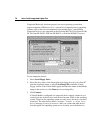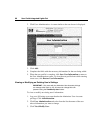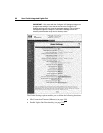
Using iLO 85
To obtain the SAC> prompt, entering Enter might be required after connecting
through the Virtual Serial Port console.
For more information on using the EMS features, refer to the Windows® Server
2003 documentation.
Security Information
If Remote Console Data Encryption is enabled, the Virtual Serial Port data
stream is encrypted as data is passed between the iLO system and the viewing
applet.
Virtual Serial Port and Linux
The /dev/ttyS0 device, if configured, provides the ability to obtain serial
tty sessions through the iLO Virtual Serial Port Console. The Linux system
must be configured correctly. Refer to your specific Linux system
implementation for the appropriate commands. Some general guidelines include:
•
•
•
The Virtual Serial Port must be enabled through the host system RBSU. The
configuration allows enabling or disabling of the Remote Virtual Serial Port.
Refer to the host system RBSU documentation for the specific server for
exact details. Generally, the RBSU contains a tab called BIOS Serial
Console/EMS Support tab. Selecting this tab displays the EMS Console tab,
which should be set to Remote. This enables both the Virtual Serial Port and
the Windows® EMS Console.
To begin a shell session on the configured UART, the appropriate Linux
process must be started. This process can be started from the shell, but is
usually configured in the /etc/inittab file to have the process available after
the kernel has booted.
s0:2345:respawn:/sbin/agetty 115200 ttyS0 vt100
Linux expects the serial port to appear at the standard UART I/O address
(0x3F8); however, LOM_short_name> presents the port at the non-standard
address of 0x408. To inform Linux of the non-standard address, the
following command must be used. This command can be placed in the
rc.serial file which is commonly called from /etc/rc.local at system startup.
setserial /dev/ttyS0 uart 16550A port 0x0408 irq 4


















